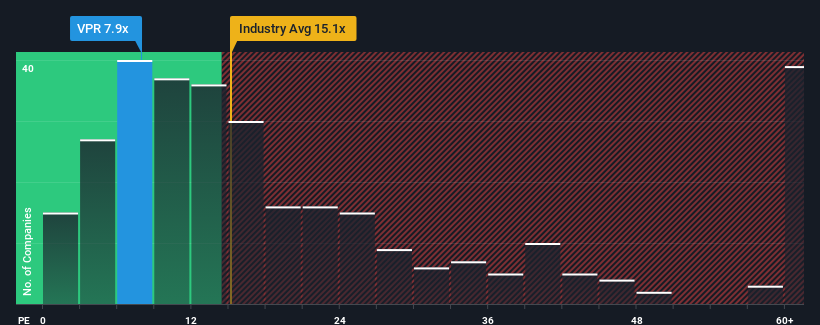- Australia
- /
- Renewable Energy
- /
- ASX:VPR
Little Excitement Around Volt Group Limited's (ASX:VPR) Earnings As Shares Take 33% Pounding
Volt Group Limited (ASX:VPR) shareholders that were waiting for something to happen have been dealt a blow with a 33% share price drop in the last month. To make matters worse, the recent drop has wiped out a year's worth of gains with the share price now back where it started a year ago.
In spite of the heavy fall in price, given about half the companies in Australia have price-to-earnings ratios (or "P/E's") above 17x, you may still consider Volt Group as a highly attractive investment with its 7.9x P/E ratio. Although, it's not wise to just take the P/E at face value as there may be an explanation why it's so limited.
Recent times have been quite advantageous for Volt Group as its earnings have been rising very briskly. It might be that many expect the strong earnings performance to degrade substantially, which has repressed the P/E. If that doesn't eventuate, then existing shareholders have reason to be quite optimistic about the future direction of the share price.
See our latest analysis for Volt Group

How Is Volt Group's Growth Trending?
There's an inherent assumption that a company should far underperform the market for P/E ratios like Volt Group's to be considered reasonable.
Retrospectively, the last year delivered an exceptional 125% gain to the company's bottom line. Pleasingly, EPS has also lifted 77% in aggregate from three years ago, thanks to the last 12 months of growth. Accordingly, shareholders would have probably welcomed those medium-term rates of earnings growth.
Comparing that to the market, which is predicted to deliver 25% growth in the next 12 months, the company's momentum is weaker based on recent medium-term annualised earnings results.
With this information, we can see why Volt Group is trading at a P/E lower than the market. Apparently many shareholders weren't comfortable holding on to something they believe will continue to trail the bourse.
What We Can Learn From Volt Group's P/E?
Having almost fallen off a cliff, Volt Group's share price has pulled its P/E way down as well. While the price-to-earnings ratio shouldn't be the defining factor in whether you buy a stock or not, it's quite a capable barometer of earnings expectations.
As we suspected, our examination of Volt Group revealed its three-year earnings trends are contributing to its low P/E, given they look worse than current market expectations. At this stage investors feel the potential for an improvement in earnings isn't great enough to justify a higher P/E ratio. Unless the recent medium-term conditions improve, they will continue to form a barrier for the share price around these levels.
Don't forget that there may be other risks. For instance, we've identified 3 warning signs for Volt Group (2 make us uncomfortable) you should be aware of.
You might be able to find a better investment than Volt Group. If you want a selection of possible candidates, check out this free list of interesting companies that trade on a low P/E (but have proven they can grow earnings).
New: Manage All Your Stock Portfolios in One Place
We've created the ultimate portfolio companion for stock investors, and it's free.
• Connect an unlimited number of Portfolios and see your total in one currency
• Be alerted to new Warning Signs or Risks via email or mobile
• Track the Fair Value of your stocks
Have feedback on this article? Concerned about the content? Get in touch with us directly. Alternatively, email editorial-team (at) simplywallst.com.
This article by Simply Wall St is general in nature. We provide commentary based on historical data and analyst forecasts only using an unbiased methodology and our articles are not intended to be financial advice. It does not constitute a recommendation to buy or sell any stock, and does not take account of your objectives, or your financial situation. We aim to bring you long-term focused analysis driven by fundamental data. Note that our analysis may not factor in the latest price-sensitive company announcements or qualitative material. Simply Wall St has no position in any stocks mentioned.
About ASX:VPR
Volt Group
Engages in the provision of power generation technology solutions in Australia.
Flawless balance sheet with acceptable track record.
Market Insights
Community Narratives



